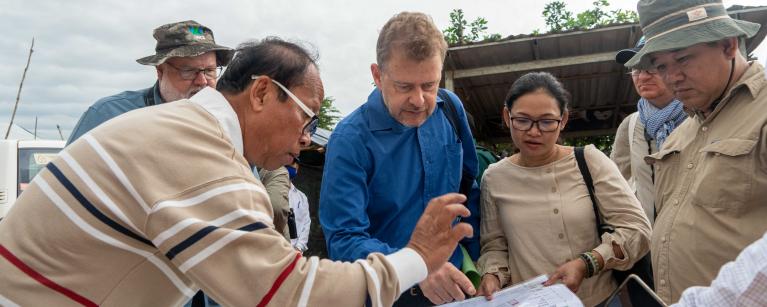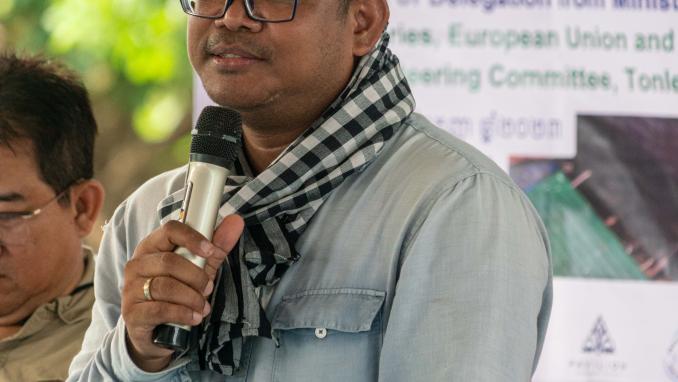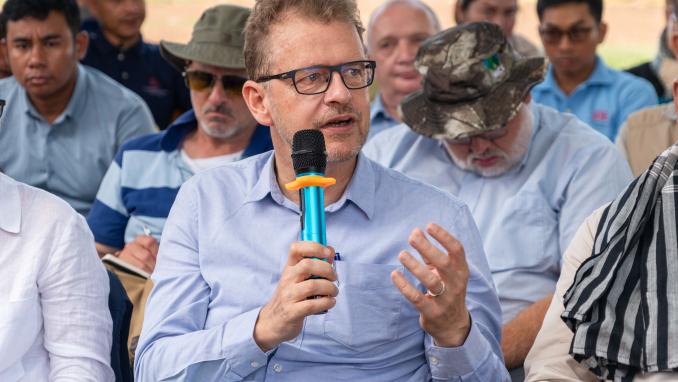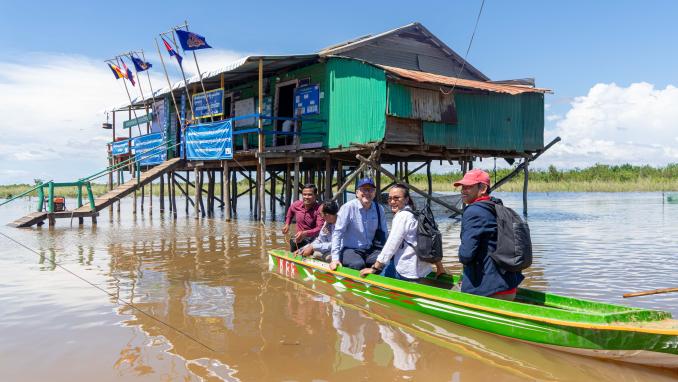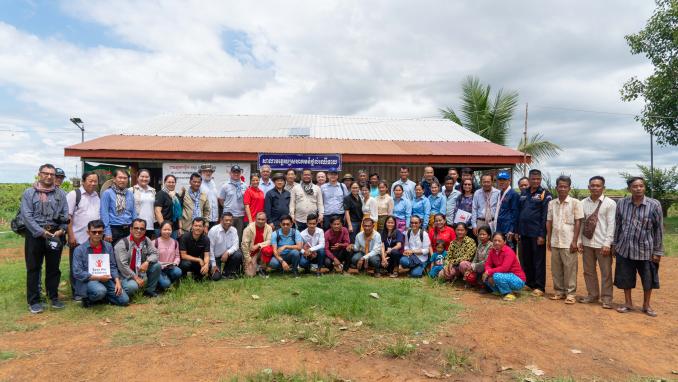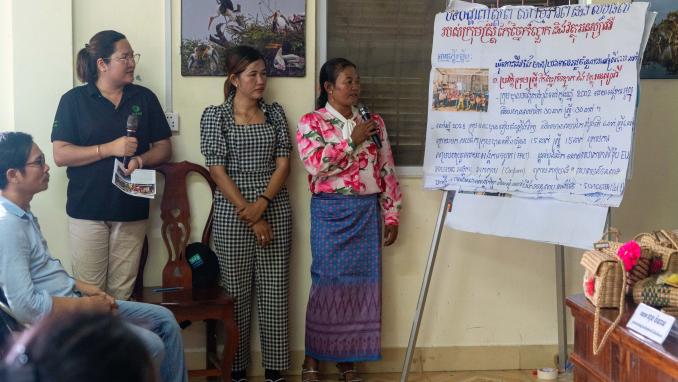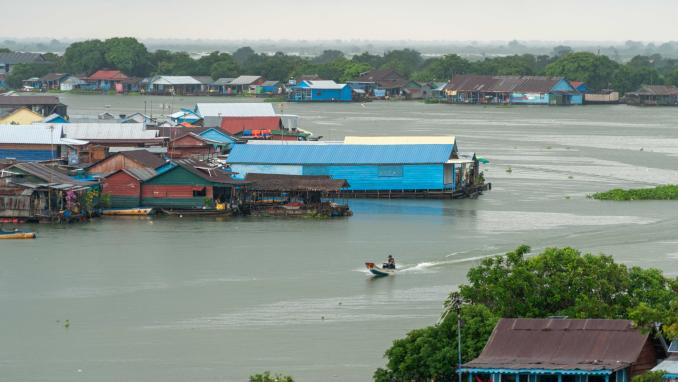The fishing communities in the Tonle Sap region in Cambodia face numerous challenges, including limited access to education, environmental degradation, and struggling livelihoods. The EU-funded CAPFISH project, implemented by Oxfam, Save the Children, and the Wildlife Conservation Society (WCS) has transformed the lives of the local communities and paved the way for sustainable development in the fisheries sector.
In late September 2023, a distinguished delegation comprised of representatives from the Fisheries Administration, Ministry of Agriculture, Forestry and Fisheries (MAFF), the Delegation of the European Union to Cambodia (EU), and the CAPFISH Steering Committee embarked on a journey to witness the profound impact of the program. Their visit brought to light the remarkable advancements in education, conservation, and the improved livelihoods of the Tonle Sap communities.
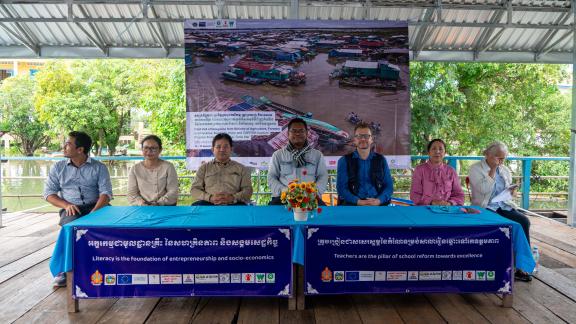
Delegation meet with commune chief, teacher, students, and parents in Koh Chivoang commune to understand the progress and challenges about education status. From left: Mr. Samphors Vorn , AEA Country Director, Ms. Sophoan Phean, Oxfam National Director, Mr. Roitana Buoy, Deputy Director General of FiA, H.E. Savoeun Khun, Secretary of State of MAFF, Mr. Koeun Everat, Deputy Head of International Cooperation of the European Union, Ms. Phearun Meas, Deputy Director of Provincial Department of Education, Youth, and Sports in Battambang province and Mrs. Davy Tith, OEC Executive Director. Photo: Kimheang Tuon/Oxfam
Immersing themselves in the local communities, the delegation engaged with preschools, primary and secondary schools, and the local administration in Thnal Chheuteal village and the Prek Toal Ramsar Site, nestled within the heart of the Tonle Sap biosphere. This immersive experience allowed them to witness firsthand the tangible benefits brought about by the CAPFISH program. They marveled at the program’s positive influence on natural resource conservation and the flourishing livelihoods of the community members. In unison, they applauded the collaborative efforts of Oxfam, Save the Children, WCS, and other stakeholders who had played an instrumental role in this transformation.
Stretching its reach across ten Cambodian provinces, including six along the Tonle Sap lake and four along the coast, the CAPFISH initiative focused on sustainable fisheries, education, access to clean water, hygiene, and sanitation. Its overarching goal was to foster a resilient and inclusive development of Cambodia’s fisheries sector, breathing new life into the region.
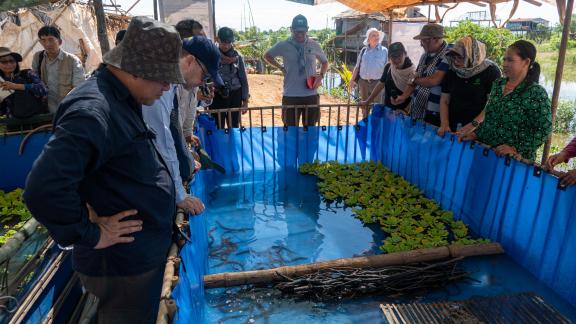
The delegation visited the eel rearing by the beneficiaries in the Thnal Chheuteal community, located in Kampong Chhnang province. Photo: Kimheang Tuon/Oxfam
Mr. Savoeun Khun, Secretary of State of the Ministry of Agriculture, Forestry and Fisheries, expressed his delight at witnessing the positive impact of the EU-funded projects implemented by Oxfam, Save the Children, and WCS Cambodia. The visit provided invaluable insights into the projects’ profound influence on the local communities and the effective management of natural resources. He extended his heartfelt appreciation to the European Union for their unwavering support, emphasizing that this was the largest program ever to be undertaken in Cambodia’s fisheries sector.
Mr. Koen EVERAERT, Deputy Head of Cooperation at the European Union to Cambodia, reaffirmed the EU’s commitment to partnering with MAFF and civil society partners to ensure the sustainable development of the fisheries sector and environmental conservation in Cambodia. He hailed the EU-funded projects in Tonle Sap as shining examples of their shared vision, one that encompasses the protection of nature and the improvement of local communities’ living standards. Notably, the CAPFISH project stands as the largest fisheries program funded by the EU globally, setting the stage for similar initiatives around the world.
With the support of the European Union, Oxfam has touched the lives of over 5,833 marginalized children, opening doors to education and a brighter future. The establishment of 14 Community Green Business Hubs has created a ripple effect, positively impacting 1,739 households and fostering economic opportunities. Furthermore, the launch of the Tonle Sap Eco-Tourism Network (TEN) has provided community fisheries with an avenue to generate alternative income through tourism, paving the way for sustainable livelihoods and a thriving economy.
The CAPFISH project has truly transformed the Tonle Sap region, empowering communities, and nurturing a sustainable fisheries sector. Through collaborative efforts, innovative initiatives, and the unwavering support of the European Union, this story serves as an inspiration to all, demonstrating the profound impact that can be achieved by prioritizing education, conservation, and community well-being. As the journey continues, the CAPFISH project stands tall as a beacon of hope, guiding the way toward a brighter and more sustainable future for the Tonle Sap communities.
